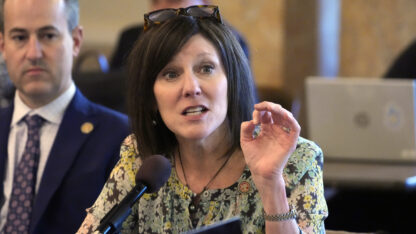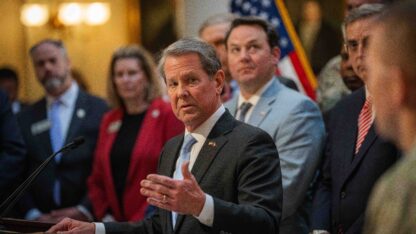State House Democrats continue to push back against a new GOP-backed bill that would further delay any possible deal on Medicaid expansion until after this year.
Earlier in the legislative session, House Speaker Jon Burns had signaled he was open to learning more about a full possible expansion.
Now with just days to go before a key General Assembly deadline when bills must cross over from one chamber to another in order to have a chance of final passage, Medicaid expansion’s chances seem to be fading.
House Swainsboro Republican Butch Parrish is sponsoring House Bill 1339, which would loosen state regulations governing where healthcare facilities can operate, known as certificate of need.
“This is a start to do that and we want to make incremental steps and move in the right direction,” to reform the decades-old health system rules, he said.
The bill would not eliminate certificate of need altogether, which some top Senate lawmakers have pushed for.
“We are satisfied with this deal. We would like to see the House bill passed as is. And we hope the Senate will go along with that,” said Monty Veazey, president of the Georgia Alliance of Community Hospitals.
“Building a hospital is not like building a shoe store. A shoe store does not have to discount their pricing. They do not have to give away services and they do not have to run bad debt. Those are some of the things that make it different. And, it must be a level playing field,” said Veazey. “And I think certificate of need does provide a level playing field.”
H.B. 1339 would also create a new study commission tasked with advising the governor and his administration on “issues related to access and quality of healthcare for Georgia’s low-income and uninsured populations,” as well as reimbursement and funding for Georgia healthcare providers.
Johns Creek Democrat Michelle Au urged her Republican counterparts to pass full Medicaid expansion this year.
“We don’t need more meetings, we don’t need another study committee, we do not need another joint commission to tabulate and retabulate the numbers that we already have,” she said. “Why are you still so afraid? What are you waiting for?”
Au and a coalition of House Democrats are supporting H.B. 62 to fully expand Medicaid under the Affordable Care Act.
KFF Health News analysts forecast that full expansion would cover more than 400,000 uninsured adults with incomes up to 138% of the federal poverty line.
Georgia is among 10 states that have not fully expanded Medicaid.
The most recent state to expand is North Carolina, which launched full expansion on Dec. 1.
Republican Gov. Brian Kemp has doubled down this year on the Georgia Pathways program, a limited expansion of Medicaid insurance for adults with incomes at the poverty line, $14,580 for an individual if program participants complete 80 hours per month of work, education or other approved activities.
Pathways has seen sluggish signups since its launch last summer. Between July and December, fewer than 2,400 people have enrolled in the work-requirement program.
“We continue to be 100-percent supportive of Gov. Kemp’s Pathways to Coverage program. At the same time, knowing that that waiver may expire in 2025, we also want to take the time to gather the facts, hear from policy experts and stakeholders, and craft the best policy possible to support our low-income, uninsured population across the state, which will help patients and providers alike,” said Burns.
Georgians for a Healthy Future Executive Director Laura Colbert called the creation of a new advisory commission on Medicaid expansion a “small step in the right direction,” but she said further delaying expansion would mean Georgia continues to miss out on $3 billion in federal funds.
“There is more than enough evidence to show that closing the [coverage] gap would be a good deal for Georgia financially and that it will improve the health of people across the state,” she said in a statement. “Keeping hardworking Georgians from the coverage that they need for another year is not only costly for Georgia families but is harmful to the health of the state’s workforce and keeps rural hospitals on the ropes.”
Georgia has seen more than a dozen hospital closures over the last decade.
A recent report from healthcare advisory services firm Chartis found there are currently another 18 hospitals vulnerable to closure, landing Georgia in the top 10 states with the most at-risk hospitals in the country.









